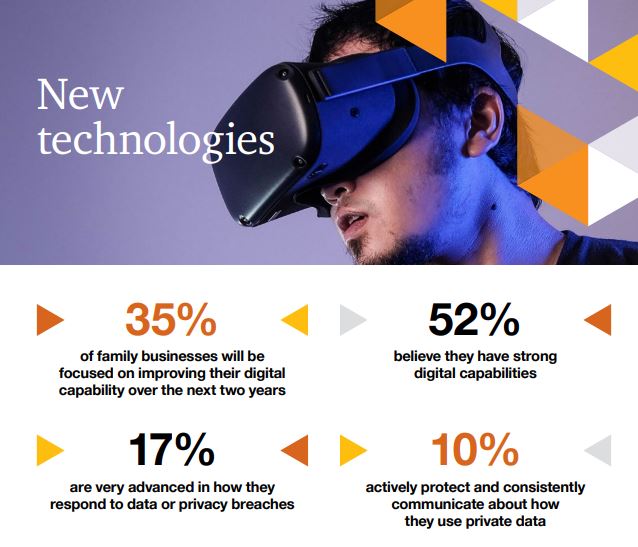Bridging the Digital Gap: Effective IT Transformation for Family-Owned Enterprises
- September 20, 2024
- Posted by: FOYI
- Category: Blog

Data analytics and IT transformation
In the competitive modern business environment, the ability to harness technology—and in particular, data analytics —can be the key differentiator between businesses that thrive and those that get left behind. Therefore, data analytics must be part of all IT transformation projects.
For family-owned companies, technology presents both opportunity and challenge. While family-owned enterprises often possess deep industry knowledge, loyal customer bases and deeply committed staff, they can struggle with technology adoption, data-driven decision-making and IT transformation.
This article explores these challenges and introduces a unique approach to IT transformation—one that balances innovation and business evolution with a people-centric approach particularly suited for family enterprises looking to better utilise data analytics.
The unique nature of family-owned businesses
Family-owned businesses present a unique dynamic where the lines between personal relationships and professional roles often blur. In these enterprises, intimacy between owners and employees frequently intertwines with professional and personal relationships, and even non-family staff are often viewed as extended family.
While this fosters loyalty, stability, and institutional knowledge, it can also lead to entrenched processes, resistance to technological change and a reliance on legacy behaviours. Employees who have been with a company for decades or more may struggle to adapt to new systems and data-driven decision-making processes. Familiar ways of doing things, even if inefficient, can feel safer than venturing into unknown territories, such as data analytics.
Key Technological Challenges
According to PWC’s Family Business Survey 2023 , 35% of family businesses will focus on improving their digital capability over the next two years.

But while family-owned businesses recognise the potential of data-driven decision-making , many lack the tools and expertise to leverage their data for effective data analytics strategy. strategic planning. Identifying trends and patterns in business information is challenging, and without meaningful KPI dashboards providing clear, actionable insights, these businesses frequently struggle with informed decision-making.
Similarly, justifying large expenditures for data analysis and IT transformation can be a challenge, especially with external consultants regularly demanding significant upfront investments—sometimes tens of thousands of dollars—just to perform an initial data review.
The Shortcomings of Traditional Consulting Approaches
While 41% of Kiwi family businesses feel at risk of digital disruption in the short to mid-term, traditional IT consultancies often fail to meet the unique needs of those same organisations.
If you’ve dealt with external consultants before, see if any of these scenarios sound familiar:
Many traditional consultancies prioritise implementing cutting-edge technology solutions without adequately accounting for a family-focused organisation’s unique culture, values, and interpersonal dynamics. This technology-centric approach too often neglects the crucial role that people and relationships play in these organisations, leading to change resistance, poor adoption rates, and ultimately, failed implementations.
Similarly, traditional consultants may not fully grasp the intricate dynamics of family-owned businesses. Understanding the complex interplay of family relationships, roles, and long-standing ways of doing business needs a considered approach. Consultants focused on ‘doing the deal’ in this fashion rarely acquire the nuanced understanding needed for effective change management in family businesses.
As mentioned above, consultancies often require hefty upfront payments, even just for initial assessments, usually without any sort of guaranteed tangible outcome. For family businesses operating on tighter budgets, this ‘high-risk’ approach can be a significant deterrent.
A human-centric approach to IT transformation
The alternative to the traditional consulting approaches is a an approach designed specifically to leverage the organisations’ strengths while addressing their technology challenges. The following are the foundations of such an approach.
A robust analytics strategy cannot be built without a solid business strategy. The approach must begin by understanding your business goals, challenges, and vision for the future. Only then should you consider what technological solutions might align with these objectives.
No one knows your business as well as you. Before any changes, businesses must take the time to thoroughly understand the current priorities, processes and people. Only then should you to identify areas where data analytics can complement and enhance your existing strengths, realising the most significant impact possible, while minimising disruption to your operations.
People are at the heart of every family business and they must be put at the heart of the transformation process. The change management approach must focus on building consensus, addressing concerns, and ensuring that everyone from the shop floor to the boardroom is on board with the changes —and then working to produce the very best possible outcome for the business.
Concluding remarks
Data analytics needs to be part of all IT transformation projects. As for the IT transformation for family owned businesses, people first approach is the most effective way to have the biggest impact on business performance.
Contact Us for an introductory call to understand how we can help you.
